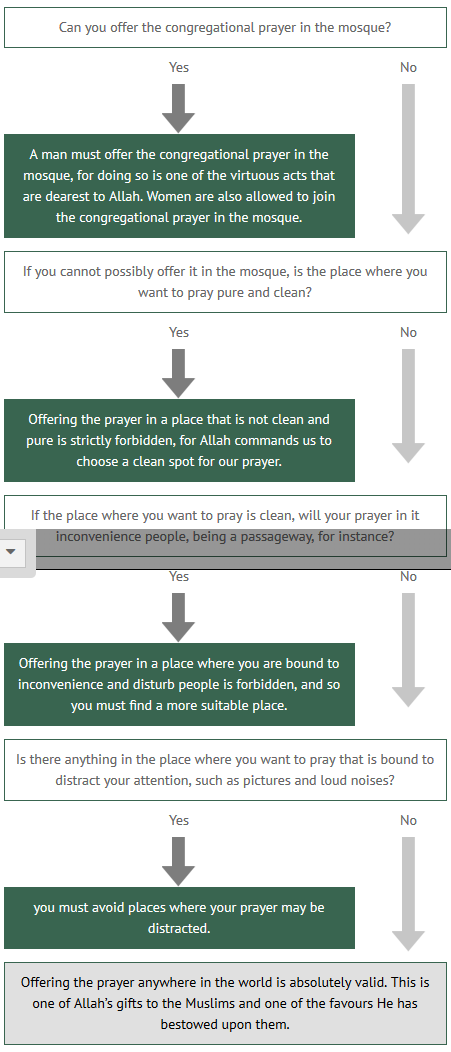Islam commands men to perform congregational prayers and encourages them to do so in the mosque, which provides a social forum for Muslims. Congregational prayers help increase and strengthen the bonds of brotherhood, unity and togetherness between them. In fact, Islam promises greater rewards for those who join the congregational prayers, as the prophet ﷺ said, “The reward for a prayer a man offers in congregation is twenty-seven times greater than that for a prayer he offers by himself.” (Saheeh Al-Bukhaaree: 619, Saheeh Muslim: 650, and Musnad Ahmad: 5921)
The prayer can, however, be performed anywhere. This reflects one of the favours Allah ﷻ has bestowed upon us, making this religion easy and practical. The prophet ﷺ said, “The earth has been made a place of prayer for me, and it is pure (i.e. suitable for performing tayammum when there is no water available or when one is unable to use it). Therefore, anyone from my community who is overtaken by the time of prayer can pray wherever they may be.” (Saheeh Al-Bukhaaree: 328; Saheeh Muslim: 521)
Criteria That Must Be Met Regarding the Place of Prayer
Islam stipulates that the place where we intend to offer the prayer must be pure and clean, as the Qur’an states, “We commanded Abraham and Ishmael: ‘Purify My House for those who walk round it, those who stay there, and those who bow and prostrate themselves in worship.’”(Soorat Al-Baqarah, 2:125) As a general rule, wherever we intend to pray must be clean and pure unless it is clear beyond any doubt that it has been smeared by some impurity. Therefore, if there is nothing that might otherwise render a place impure, it must be considered clean, and we are allowed to offer our prayer on it without the need of using a prayer mat.
There are a number of criteria and conditions that must be met regarding the place where we intend to pray, and they include the following:
- One must not pray in a place where he may disturb people, such as busy public areas, passageways and places where one is not allowed to stand or sit, as this can lead to crowdedness and cause a great deal of inconvenience. The prophet ﷺ said, “There should be neither harming, nor reciprocating harm.” (Sunan Ibn Maajah: 2340, Musnad Ahmad: 2865)
- The place must be free from things which may otherwise cause distraction, such as pictures (like the ones found on some prayer mats), loud noises and music.
- One must not pray in a place where worship is ridiculed, such as a place where there are drunken people or fanatics. Almighty Allah forbids Muslims to abuse the false deities of non-Muslims so that they may not in revenge abuse Allah ﷻ in their ignorance: “Do not insult those they call upon besides Allah in case that makes them insult Allah in animosity, without knowledge .” (Soorat Al-An‛aam, 6:108)
- One must not pray in a place specifically designed for committing sinful acts, such as ballrooms and nightclubs.

Source: https://www.newmuslimguide.com/en/your-prayer/142

